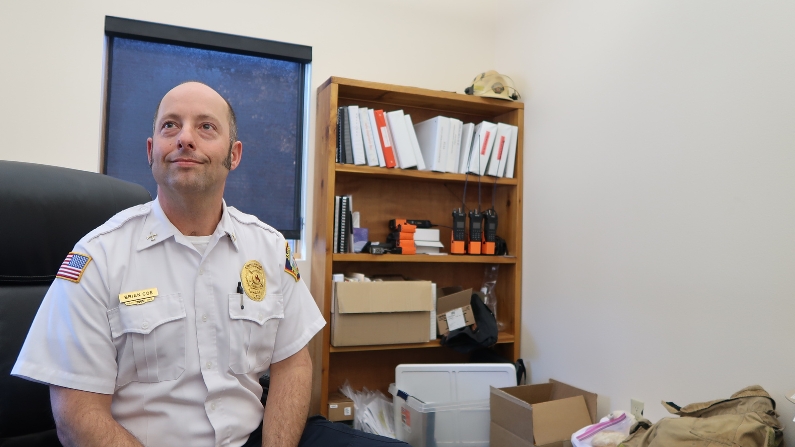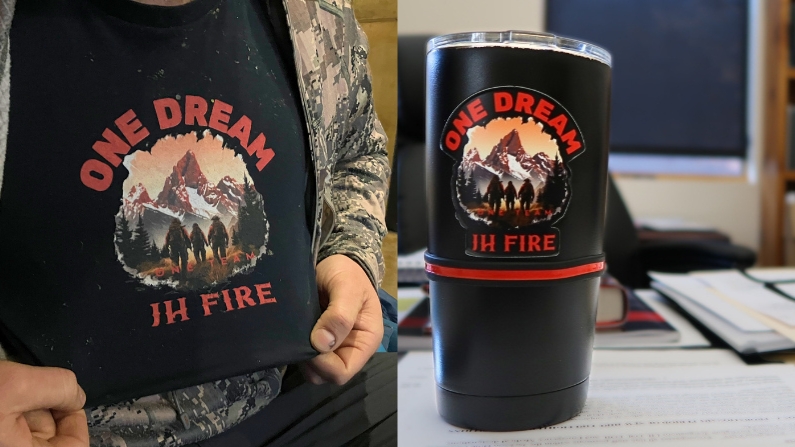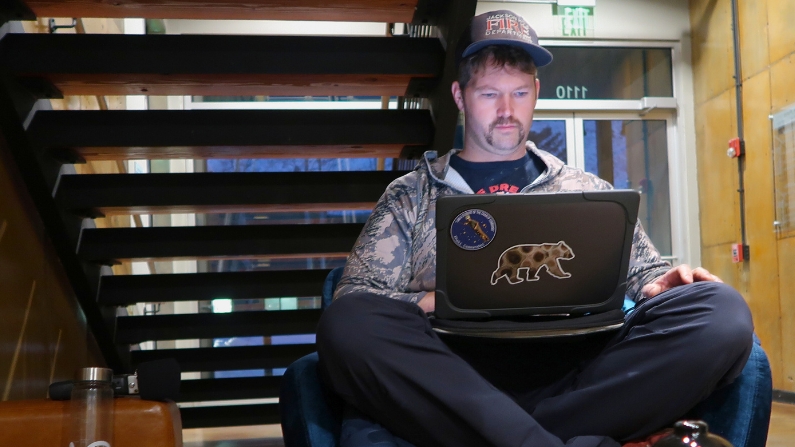Take a deep-dive into Jackson Hole. Subscribe to Jackson Unpacked, available wherever you get your podcasts.
Assistant Fire Chief Brian Coe is still moving into his office in downtown Jackson and his whiteboard is a multicolored to-do list.
After about a year as interim chief, Coe was hired for the permanent assistant position in January under Chief Mike Moyer. Combined, the pair have 50 years in Jackson Hole emergency response.
Coe isn’t eager to talk publicly about the most recent rough patch.
“I’d say that the past is the past,” Coe said. “Right now we’re definitely more focused on the future.”
A year ago this month, Jackson Hole Fire/EMS was in turmoil. Firefighters, some of their partners and friends and other community members were turning up in droves to the Teton County Commission chambers, urging officials to get rid of the then-fire chief and the person who hired him, the county’s administrator. By early March, both had resigned.
Coe does want to talk, though, about fundamentals, like answering 911 calls, an in-progress five-year strategic plan. He talks about the cranes jutting out of the town’s small skyline and plans for over 1,000 homes south of town that are now cow pasture. It’s Coe’s job to help guide how the department will add stations and employees over the years.

After 20 years as a Jackson Hole firefighter, Brian Coe was sworn in Jan. 10 as permanent assistant fire chief. (Sophia Boyd-Fliegel / KHOL)
Away from work and out of uniform, there’s a little more room for others to speak their mind about lingering stress.
After a 48-hour shift, firefighter Nathaniel “Natty” Hagood grabs tea before heading home. He often swings by Picnic after work to get coffee — tea if he wants to sleep — and a matcha for his wife at home with his infant.
Hagood opened his laptop to check a GoFundMe he published about a week prior, while emphasizing that he is not an official spokesperson for the department.
Hagood is hedging because the fund is for legal fees of five people — out of many — who criticized former Chief Stephen Jellie before he resigned in January 2024 after about a year on the job. Four of the defendants are spouses of firefighters, including Coe’s wife, Laura. The others are Gloria Courser, Lisa McGee, Dan Nelson and Deborah Lee Tucker.
Jellie is suing on three counts: defamation, civil conspiracy and “tortious interference,” essentially, comments he says got him fired from two jobs and have killed his chances of finding another.
After Wyoming, Jellie spent less than 60 days employed as the city manager of Palmer, Alaska and resigned with $75,000 in severance. That’s just half of what he got after about a year in Jackson Hole. And before Wyoming, Jellie was city manager in Ogdensburg, New York, where he left before his contract expired with a $50,000 buyout.
Reached on his cell phone, the former chief wasn’t comfortable saying where he was now, but objected strongly to what others say is a strategy: move from town to town, collecting payouts.
“That’s unsubstantiated,” he said, “[a claim from] conspiracy theorists local government disruptive people who want to find the negative in everything.”
Jellie’s latest filing has roughly 50 instances he claims have harmed him, including statements from emails and public comments to county commissioners and Facebook posts and private messages from defendants.
Comments range from the technical — like if Jellie forbade firefighters from speaking professionally to partners at Grand Teton National Park or bought expensive equipment from a friend — to the deeply personal, like characterizations of the chief as “toxic,” or “a borderline narcissist.”
Several defendants said they couldn’t talk about the lawsuit to the press, but others in and around the department confirmed they’re bracing for a legal process that could take about two years.
Lawyer time will be expensive.
That’s why Hagood is hoping to fundraise $100,000. By Jan. 10 the fund had raised over $20,000.
Hagood sees this as one small way to help. In an ideal world, he said, none of the families would feel a financial burden, though it’s still stressful.
“There’s no way to relieve them of the emotional and psychological burden that comes with responding to a lawsuit,” Hagood said.
If not legal fees, the money will go to the fire department’s foundation.
With all the criticism Jellie has seen in his last three jobs, it remains a point of speculation as to why these people connected to Jackson Hole Fire/EMS are being sued now.
Some firefighters said going after spouses is the ultimate scare tactic and think it’s because his separation agreement in Wyoming prevents him from suing his former employees, though Jellie wouldn’t comment on that.
Jellie is adamant that this public criticism is different, specifically, more harmful and false, rather than judgement calls.
As Jellie tells it, much of the drama was inevitable. He was hired in New York to lay off first responders and pull the city out of bankruptcy. He was hired in Jackson to control a ballooning budget. He was hired in Palmer, Alaska to make more tough cuts to, for example, the dispatch budget and the council decided they didn’t like his style.
“You inherit a city in bankruptcy. You lay people off,” Jellie said. “If there was a good way to do those things, somebody would have done them.”
As for the end of what the Alaskan Mat-Su Sentinel called the “Jellie saga,” a court, maybe a judge, possibly a jury, will decide.
The next chapters are foreshadowed by the first filing to answer Jellie from lawyers for defendant Lisa McGee. The 10-page document reads as an enumerated list of, mostly, the words “defendant denies the allegations.”
If the saga has an epilogue in Jackson Hole, it appears to be that firefighters are trying their best to move on.
Some references to the past are not spoken, but visual. On Coe’s desk is a coffee mug with a sticker. The silhouettes of three firefighters, framed by pines, march toward the Tetons. Hagood’s tee shirt has the same design, which he distributed on stickers when Jellie was at the helm.

Efforts to combat divisions are sometimes not spoken as the fire department tries to move on, seen here in a sticker and a tee shirt. (Sophia Boyd-Fliegel / KHOL)
There were a handful of people that really liked Jellie, Hagood said, and there were all the people that struggled under him. But that division made it so that the department was incredibly stressed.
“Everyone was at each other’s throats for stupid things,” he said. “This was a symbol to say ‘we’re all in it together.’”
Surrounding the graphic reads the words: “one dream, one team.”





